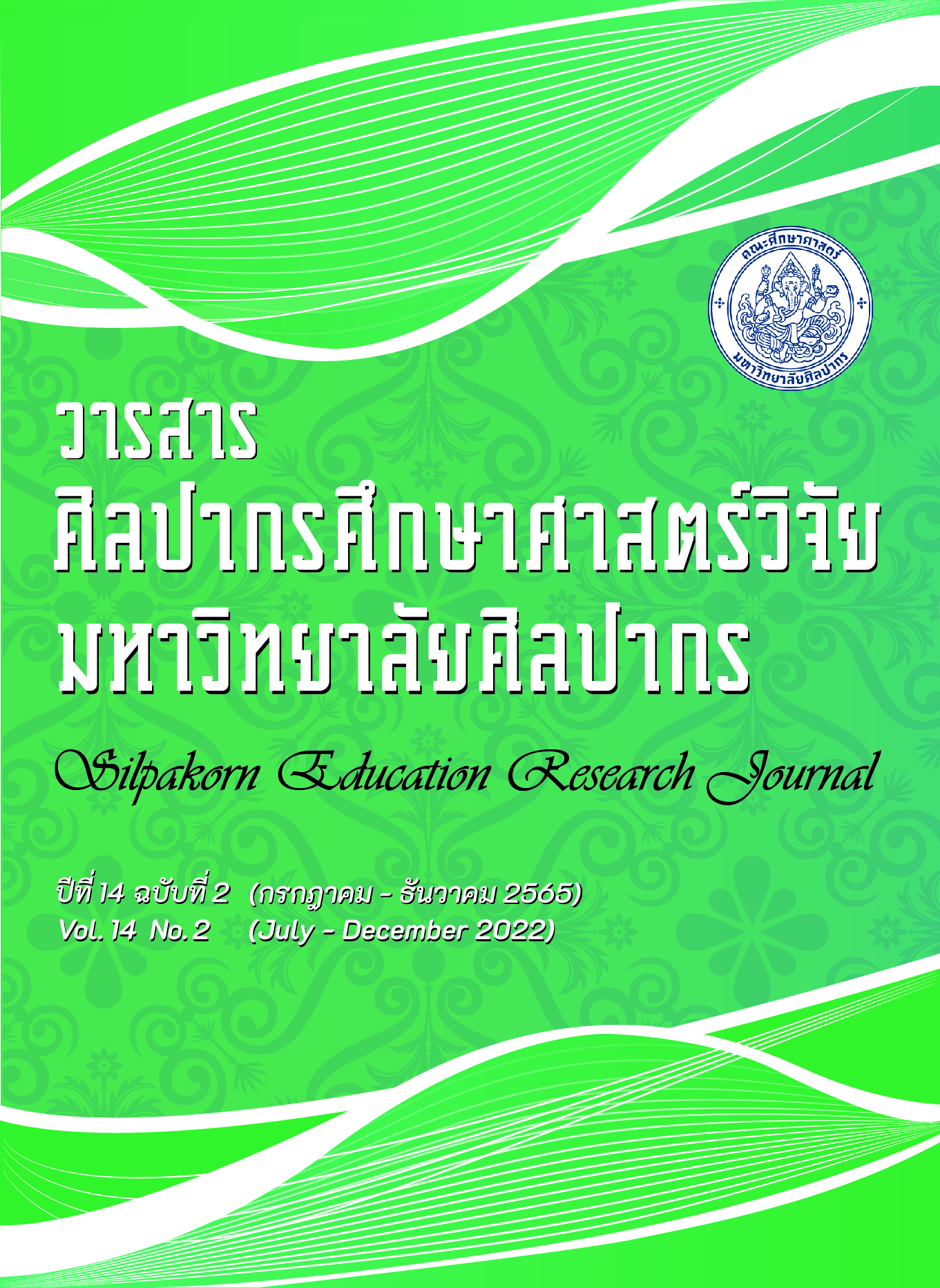ผลการจัดการเรียนรู้โดยใช้วิจัยเป็นฐานที่ส่งผลต่อความตระหนักทางวิทยาศาสตร์ และผลสัมฤทธิ์ทางการเรียนของนักเรียนชั้นมัธยมศึกษาปีที่ 4
คำสำคัญ:
การเรียนรู้โดยใช้วิจัยเป็นฐาน, ความตระหนักทางวิทยาศาสตร์, ผลสัมฤทธิ์ทางการเรียนบทคัดย่อ
งานวิจัยครั้งนี้มีวัตถุประสงค์เพื่อ 1) เปรียบเทียบความตระหนักทางวิทยาศาสตร์ของนักเรียนที่ได้รับการจัดการเรียนรู้โดยใช้วิจัยเป็นฐานก่อนเรียนและหลังเรียน และเปรียบเทียบกับเกณฑ์ และ 2) เปรียบเทียบผลสัมฤทธิ์ทางการเรียนของนักเรียนที่ได้รับการจัดการเรียนรู้โดยใช้วิจัยเป็นฐานก่อนเรียนและหลังเรียน และเปรียบเทียบกับเกณฑ์ กลุ่มตัวอย่างในการวิจัย คือ นักเรียนชั้นมัธยมศึกษาปีที่ 4 โรงเรียนนวมินทราชินูทิศ
สวนกุหลาบวิทยาลัย ปทุมธานี โดยใช้การเลือกแบบเจาะจง และดำเนินการสุ่มแบบกลุ่ม จำนวน 42 คน เครื่องมือที่ใช้ในการวิจัย ประกอบด้วย 1) แผนการจัดการเรียนรู้โดยใช้วิจัยเป็นฐาน 2) แบบวัดความตระหนักทางวิทยาศาสตร์ และ 3) แบบวัดผลสัมฤทธิ์ทางการเรียน สถิติที่ใช้ในงานวิจัย ได้แก่ ร้อยละ ค่าเฉลี่ย ส่วนเบี่ยงเบนมาตรฐาน และค่าสถิติทดสอบที ผลการวิจัยพบว่า 1) นักเรียนที่ได้รับการจัดการเรียนรู้โดยใช้วิจัยเป็นฐานมีความตระหนักทางวิทยาศาสตร์หลังเรียนสูงกว่าก่อนเรียน อย่างมีนัยสำคัญทางสถิติที่ระดับ .05 แต่ไม่สูงกว่าเกณฑ์ที่กำหนด (ระดับมากที่สุด) และ 2) นักเรียนที่ได้รับการจัดการเรียนรู้โดยใช้วิจัยเป็นฐานมีผลสัมฤทธิ์ทางการเรียนหลังเรียนสูงกว่าก่อนเรียน และสูงกว่าเกณฑ์ที่กำหนด (ร้อยละ 60) อย่างมีนัยสำคัญทางสถิติที่ระดับ .05
เอกสารอ้างอิง
Arora, V. P. S., Saxena, P., and Gangwar, N. (2017). “Project Based Leaning (PBL) and Research
Based Learning”. In Higher Education Faculty Career Orientation and Advancement. [Online]. Retrieved March 2, 2020, from https://www.researchgate.net/publication/ 316438459_Research_Based_Learning.
Fungrattanatrai, W. (2007). Communication to Create Awareness in Science and Technology in Youth: A Case Study of Science Camp Project, Technology Management Center, National Science and Technology Development Agency. Master of Arts Thesis Program in Partial Fulfillment of the Requirements Graduate School Dhurakij Pundit University. (in Thai)
Gatt, S., and Azzopardi, C. (2013). Gauging the Level of Science Awareness Amomg Early
Secondary Maltese Students. [Online]. Retrieved December 15, 2021, from https:// www.researchgate.net/publication/267810089_GAUGING_THE_LEVEL_OF_SCIENCE_AWAR ENESS_AMONG_EARLY_SECONDARY_MALTESE_STUDENTS.
Granjeiro, É. M. (2019). “Research-Based Teaching-Learning Method: a Strategy to Motivate and
Engage Students in Human Physiology Classes”. Advances in Physiology Education 43(4): 553-556. [Online]. Retrieved March 17, 2020, from https://journals.physiology. org/doi/pdf/10.1152/advan.00034.2019.
Healey, M. (2005). “Linking Research and Teaching: Exploring Disciplinary Spaces and the Role of
Inquiry-Based Learning”. In Reshaping the University: New Relationships Between Research, Scholarship and Teaching. [Online]. Retrieved February 20, 2020, from https://www.academia.edu/20490222/Reshaping_the_University_New_Relationships_bet ween_Research_Scholarship_and_Teaching.
Khammanee, T. (2014). Strategies of Teaching: Knowledge for Effective Learning Process
Management. Bangkok: Chulalongkorn University Press. (in Thai)
Kheawpra-in, D. (2017) “The Development of Learning Achievement in Biology and Research
Skills for 10th Grade Student Taught by Research-Based Learning with Flipped Classroom”. Veridian E-Journal, Silpakorn University (Humanities, Social Science and Arts) 10(2): 392-408. (in Thai)
Khumraksa, B., and Ruksakit, P. (2019). “Improvement of Science Process Skills by Using
Research-Based Instruction on Soil Properties for the 2nd Grade Students in a Municipal School, Surat Thani”. Journal of Research Unit on Science, Technology and Environment for Learning 10(1): 14-29. (in Thai)
Methakunavudhi, P. (2004). “Research-based Learning”. In Research-Based learning, Collection
of Articles, 21-37. Edited by Paitoon Sinlarat. Bangkok: Faculty of Education, Chulalongkorn University. (in Thai)
Ministry of Education. (2008). Basic Education Core Curriculum B.E. 2551 (A.D. 2008). [Online].
Retrieved March 2, 2020, from https://drive.google.com/file/d/0ByeVwALb1yssdjh0d1E5 MVFxVTQ/edit?resourcekey=0-Klefw5fpSqoelxEy3DJb_g. (in Thai)
Najaikaew, P., and Tipjoi, W. (2013). “The Effect of Science, Technology and Society Approach on Awareness and Knowledge of Science and Technology in Society of the First-Year Undergraduates”. Journal of Research Unit on Science, Technology and Environment for Learning 4(1): 46-54. (in Thai)
Nakornthap, A. (2003). “Learning Through Research : A Case Study of A Field Research-Based
Teaching, The Education and Society Class, Faculty of Education, Chulalongkorn University”. Journal of Research Methodology 16(1): 101-133. (in Thai)
National Research and Innovation Policy Council. (2017). (Draft) 20-Year National Research
and Innovation strategy (2017-2036). [Online]. Retrieved February 22, 2020 from https://www.ubu.ac.th/web/files_up/03f2019013108571396.pdf. (in Thai)
Office of the National Economics and Social Development Council. (2017). The Twelfth
National Economics and Social Development Plan (2017-2021). [Online]. Retrieved February 22, 2020, from http://www.ldd.go.th/www/files/81725.pdf. (in Thai)
Prasopkittikun, T. (1991). Assessing Awareness of Environmental Problems of
Mathayomsuksa 3 Students in Chanwat Trat. Master of Art in Teaching Thesis Field Teaching Science Graduate School Kasetsart University. (in Thai)
Ramsiri, R., and Nillapun, M. (2015). “The Development of Science Instructional Model by Using
Research-Based to Enhance Research Skills, Creative Problem-Solving Skills and Scientific Minds of Secondary School Students”. Silpakorn Education Research Journal 7(2): 110- 122. (in Thai)
Ratchawat, A. (2015). The Effects of Research-based Learning with IDSPEE Model for
Enhancing Achievement and Creative Problem Solving Ability on Element and Compound for Senior High School Students. Master of Education Thesis Program in Educational Science and Learning Management Graduate School Srinakharinwirot University. (in Thai)
Sathientharadol, P., et al. (2021). “Effects of Online Learning in the Epidemic Situation of
Coronavirus Disease 2019: A Case Study of Bachelor of Education and Bachelor of Arts Student, Program in English, University of Phayao”. Journal of SaengKhomKham Buddhist Studies 6(3): 423-439. (in Thai)
Tammachart, J. (2012). “A Research and Development of Research-Based Learning Management
Model in the Educational Research Course”. Songklanakarin Journal of Humanities and Social Science 18(1): 183-214. (in Thai)
The Institute for the Promotion of Teaching Science and Technology. (2019). Press Release of
PISA 2018 Results. [Online]. Retrieved February 22, 2020, from https://drive.google. com/file/d/18DKqGcId1dN6IWF07TXG8YZsQOg-NlWZ/view. (in Thai)
Tremp, P. (2010). Research-Based Teaching and Learning | A LERU project. [Online]. Retrieved
March 23, 2020, from http://www.hochschuldidaktik.uzh.ch/aboutus/Vortraege/RbT_ Muenchen_LERU_2010_06_11.pdf.
Tumchat, R. (2008). The Study of Awareness of Science and Technology Impact on
Environment Problem of Mathayomsuksa 3 Students in Samutsakhon Using Lisrel Model: Mutiple Group Analysis. Master of Education Thesis Program in Educational Measurement Graduate School Srinakharinwirot University. (in Thai)
Wongthong, P. (2020). “Research-Based Learning in Topic of Atomic Model to Enhance Learning
Achievement and Critical Thinking Skill of Grade 10 Students”. Journal of Research Unit on Science, Technology and Environment for Learning 11(2): 268-289. (in Thai)
Wu, L. Y., Wu, S. P., and Chang, C. (2019). “Merging Science Education into Communication:
Developing and Validating a Scale for Science Edu-Communication Utilizing Awareness, Enjoyment, Interest, Opinion formation, and Understanding Dimensions (SEC-AEIOU)”. Sustainability 11(17): 1-17. [Online]. Retrieved December 15, 2021, from https://www. mdpi.com/2071-1050/11/17/4551/htm.





